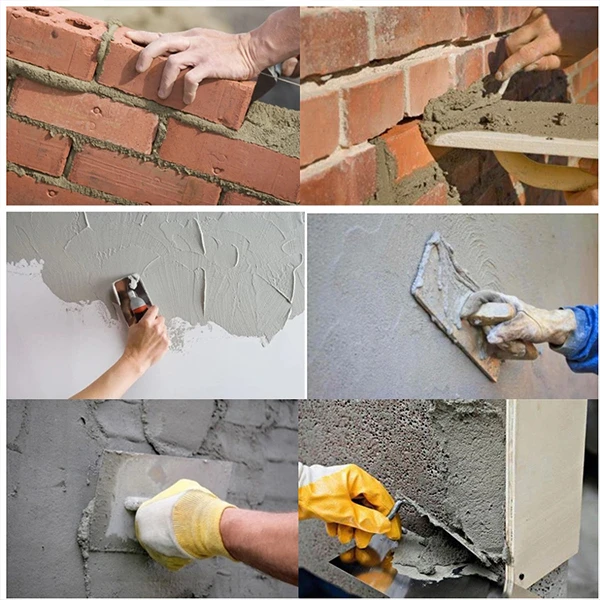Enhancing Cement Mortar with Additives A Comprehensive Overview
Cement mortar, a crucial construction material, is widely used in various applications, from masonry to plastering. Its primary components are cement, water, and aggregates. However, the performance of cement mortar can be significantly enhanced through the incorporation of various additives. These additives play a pivotal role in modifying the properties of cement mortar, making it more suitable for specific applications. This article will explore the different types of cement mortar additives, their functions, and the benefits they provide.
Types of Cement Mortar Additives
1. Plasticizers and Superplasticizers These additives improve the workability and flow of the mortar without adding extra water. Plasticizers are used for mortars that need to be workable over extended periods, while superplasticizers are employed in high-performance applications, allowing for lower water-cement ratios without compromising the consistency.
2. Retarders Retarders slow down the setting time of cement mortar, which can be crucial in hot weather conditions or when the mix needs to remain workable for an extended time. By delaying the hydration process, retarders enable better placement and finishing of the mortar, thereby improving its overall quality.
3. Accelerators On the flip side, accelerators speed up the curing process, allowing cement mortar to gain strength more rapidly. This can be advantageous in cold weather or when quick turnaround times are essential. However, it's crucial to use accelerators judiciously to avoid compromising the durability of the mortar.
4. Air-Entraining Agents These additives introduce microscopic air bubbles into the mortar, enhancing its resistance to freeze-thaw cycles. Air-entraining agents improve the workability of the mix and reduce the likelihood of cracking, making them particularly useful in regions with harsh winter climates.
5. Fibers Adding fibers, such as polypropylene or steel, can significantly enhance the tensile strength and ductility of cement mortar. Fibers help control cracking and increase the durability of the mortar. They are especially useful in applications where the mortar may be subjected to dynamic loads or thermal expansion.
6. Coloring Agents These additives allow the customization of mortar color, enhancing its aesthetic appeal. Colored mortar can be used to achieve specific design intentions in masonry projects, providing creative solutions for construction professionals.
cement mortar additive

Benefits of Using Additives in Cement Mortar
1. Improved Workability With the right additives, the workability of cement mortar can be significantly improved, making it easier to mix, apply, and finish. This is especially critical in large-scale construction projects where time and efficiency are paramount.
2. Enhanced Strength Additives can lead to increased compressive and tensile strength, which is vital for load-bearing applications. The right combination of accelerators and fibers can yield a cement mortar that can withstand greater stresses while ensuring longevity.
3. Increased Durability The incorporation of air-entraining agents and fibers leads to greater resistance to cracking and environmental conditions. This durability is essential for structures exposed to the elements, ensuring that they withstand the test of time.
4. Cost-Effectiveness While there may be an initial cost associated with purchasing additives, the long-term benefits often justify the investment. Enhanced durability and reduced maintenance needs can lead to significant savings over the lifespan of a structure.
5. Versatility Additives provide flexibility in tailoring mortar properties to meet specific project requirements. This adaptability means that construction professionals can optimize mortar performance for unique environmental conditions or architectural designs.
Conclusion
In summary, the use of additives in cement mortar is essential for optimizing its performance across various construction applications. From improving workability and strength to enhancing durability and aesthetic appeal, additives serve as invaluable tools for architects and engineers. As the construction industry continues to evolve, the role of cement mortar additives will likely expand, leading to further innovations in material performance and sustainability. Investing in the right additives not only enhances the quality of cement mortar but also contributes to the overall success of construction projects.
-
Rdp that The Revolutionary Polymer Powder Transforming Modern Construction MaterialsNewsAug.11,2025
-
Hpmc Powder that Versatile Additive for Detergents and Personal CareNewsAug.11,2025
-
Hpmc Hydroxypropyl Methylcellulose that Essential Building Material Additive from Shijiazhuang Gaocheng YongfengNewsAug.11,2025
-
Hydroxypropyl Methyl Cellulos Hpmc that Essential for Construction ApplicationsNewsAug.11,2025
-
Mhec Powder that Revolutionizing Construction Chemistry with Cellulose Ether SolutionsNewsAug.11,2025
-
Industri Hpmc that The Global Backbone of Advanced ConstructionNewsAug.11,2025




